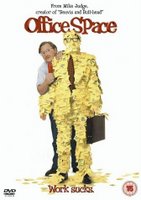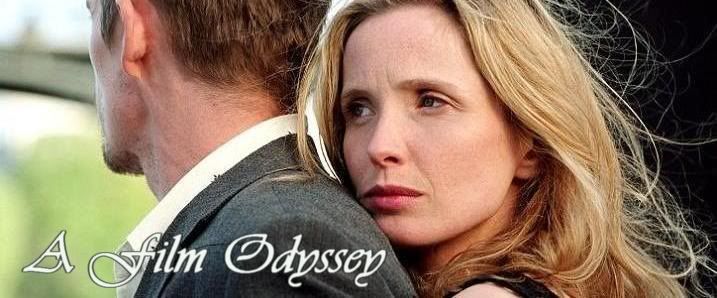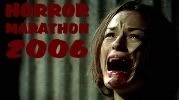
Along with Kevin Smith’s debut film
Clerks,
Office Space represents the cinematic bible of the 90’s slacker generation, a true-to-life ode to the virtues of doing absolutely nothing (and even better, being paid for it). His inner spirit almost completely eroded away by the deadening routines and repeated (not to mention unnecessary) chastisement at his programming job, Peter Gibbons (Ron Livingstone) seeks help with an “occupational hypnotherapist” whose methods prove more successful than anticipated after an unpredictable coincidence during his first session. Freed from his financial anxieties and employment-inspired woes, Peter absolves himself of all responsibility and simply enjoys life. Ironically, his newfound attitude actually gets him promoted at work while his hard-working friends are unceremoniously ejected from their occupations, prompting a plan by the trio to hack the company’s computers and steal their profits from right out under their noses. The plotline to
Office Space is secondary to its attention to the details of everyday life, from the difficulties of technology to the soulless demeanor of ones supervisor, its subtlety and intelligence finding humor where lesser films would have to place poorly crafted stupidity in its place. All this is typical of the work of Mike Judge, whose works (including “Beavis and Butt-Head” and “King of the Hill”) have been consistently smart and cunning satires on the standards of society with an affinity for memorable characters and inward reflection. The glue that holds
Office Space together, however, is the tertiary character Milton (Stephen Root), a squirrelly employee whose introverted nature is repeatedly abused by the upper management until he reaches the breaking point. He speaks for
every working person when he demands his red stapler back.




 Along with Kevin Smith’s debut film Clerks, Office Space represents the cinematic bible of the 90’s slacker generation, a true-to-life ode to the virtues of doing absolutely nothing (and even better, being paid for it). His inner spirit almost completely eroded away by the deadening routines and repeated (not to mention unnecessary) chastisement at his programming job, Peter Gibbons (Ron Livingstone) seeks help with an “occupational hypnotherapist” whose methods prove more successful than anticipated after an unpredictable coincidence during his first session. Freed from his financial anxieties and employment-inspired woes, Peter absolves himself of all responsibility and simply enjoys life. Ironically, his newfound attitude actually gets him promoted at work while his hard-working friends are unceremoniously ejected from their occupations, prompting a plan by the trio to hack the company’s computers and steal their profits from right out under their noses. The plotline to Office Space is secondary to its attention to the details of everyday life, from the difficulties of technology to the soulless demeanor of ones supervisor, its subtlety and intelligence finding humor where lesser films would have to place poorly crafted stupidity in its place. All this is typical of the work of Mike Judge, whose works (including “Beavis and Butt-Head” and “King of the Hill”) have been consistently smart and cunning satires on the standards of society with an affinity for memorable characters and inward reflection. The glue that holds Office Space together, however, is the tertiary character Milton (Stephen Root), a squirrelly employee whose introverted nature is repeatedly abused by the upper management until he reaches the breaking point. He speaks for every working person when he demands his red stapler back.
Along with Kevin Smith’s debut film Clerks, Office Space represents the cinematic bible of the 90’s slacker generation, a true-to-life ode to the virtues of doing absolutely nothing (and even better, being paid for it). His inner spirit almost completely eroded away by the deadening routines and repeated (not to mention unnecessary) chastisement at his programming job, Peter Gibbons (Ron Livingstone) seeks help with an “occupational hypnotherapist” whose methods prove more successful than anticipated after an unpredictable coincidence during his first session. Freed from his financial anxieties and employment-inspired woes, Peter absolves himself of all responsibility and simply enjoys life. Ironically, his newfound attitude actually gets him promoted at work while his hard-working friends are unceremoniously ejected from their occupations, prompting a plan by the trio to hack the company’s computers and steal their profits from right out under their noses. The plotline to Office Space is secondary to its attention to the details of everyday life, from the difficulties of technology to the soulless demeanor of ones supervisor, its subtlety and intelligence finding humor where lesser films would have to place poorly crafted stupidity in its place. All this is typical of the work of Mike Judge, whose works (including “Beavis and Butt-Head” and “King of the Hill”) have been consistently smart and cunning satires on the standards of society with an affinity for memorable characters and inward reflection. The glue that holds Office Space together, however, is the tertiary character Milton (Stephen Root), a squirrelly employee whose introverted nature is repeatedly abused by the upper management until he reaches the breaking point. He speaks for every working person when he demands his red stapler back.




